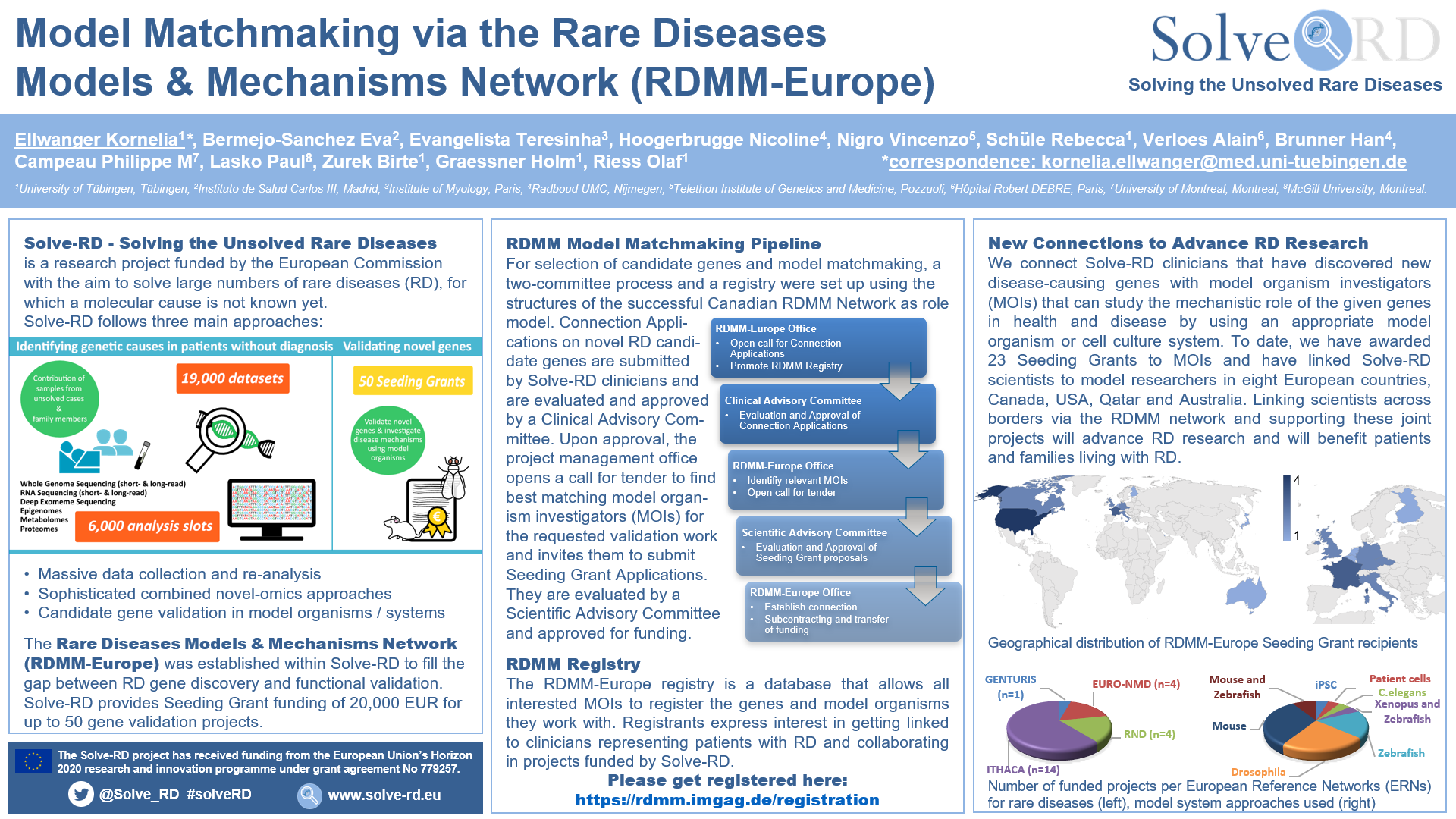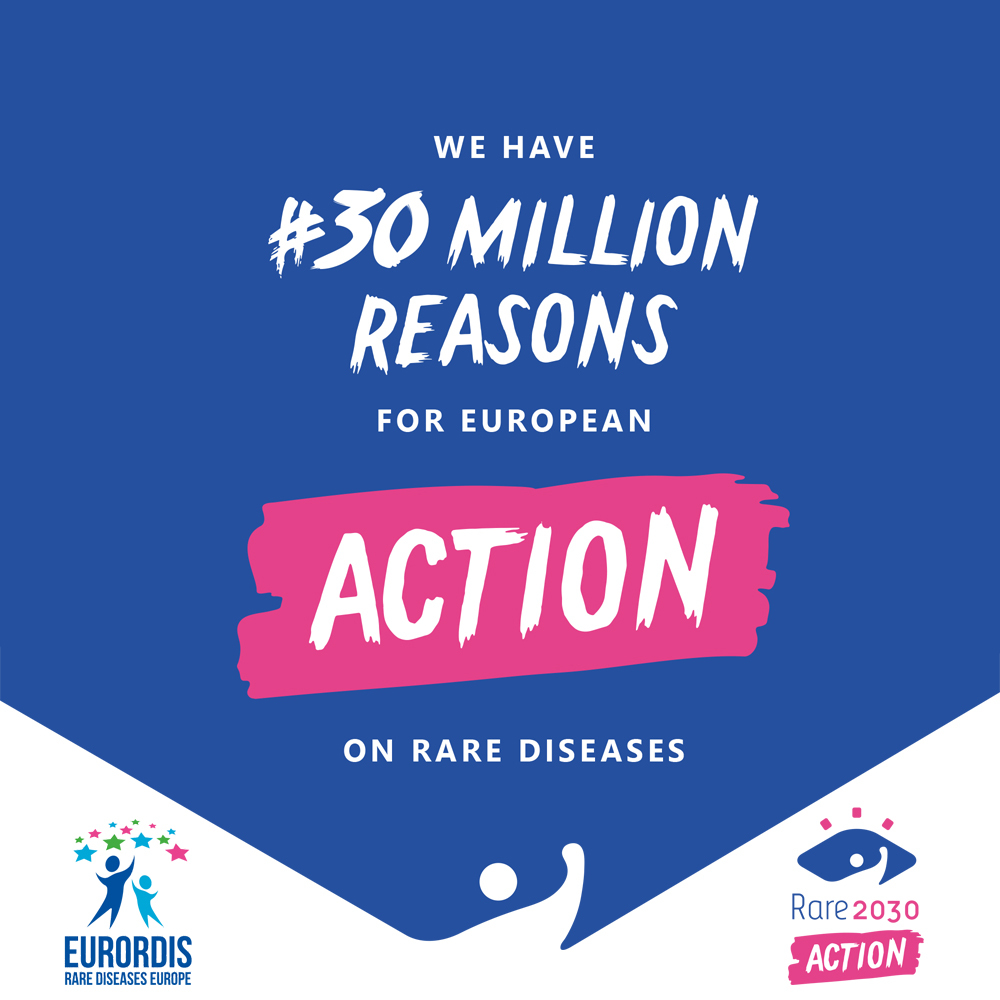25-26 April 2022, fully online Continue reading “Solve-RD Annual Meeting 2022”
Author: Birte Zurek
Solve-RD workshop: Navigating the Sandbox

Solve-RD workshop: Navigating the Sandbox
Solve-RD WP4 is organising a workshop on how to navigate the Sandbox.
Date & Time: Thursday, 19 May 2022, 14:00 - 15:30 CEST
Registration link: https://us02web.zoom.us/meeting/register/tZIode-qpzgqH91W9XYlhme0N4A11kWEVqvL
OBJECTIVES
This combined webinar & workshop will provide an update on Solve-RD Sandbox services/functions, and also consider future plans, needs and possibilities. Intended participants include ERN data controllers/producers (to ensure that their data is being managed in ways they are happy with) and DITF members (to ensure they have services they need now and going forward).
To begin, the current status of the Sandbox will be presented, including its RD3 metadata layer and the Discovery-Nexus support capabilities. Via these components, users can find, filter, and access cases and related data and results. The system will be demonstrated for some example use cases. The meeting will then transition into a workshop activity, to gather reflections from participants, and propose improvements for the future. This will encompass possibilities within and beyond Solve-RD, including multi-omic data analyses and the ambition of federating services with those of EJP-RD and GPAP.
AGENDA
- Overview (Presenter: Joeri van der Velde, UMC Groningen & Anthony Brookes, University of Leicester) | 40 minutes
- Sandbox design and utility
- RD3 metadata database
- Discovery-Nexus capabilities - Demo: Finding cases/data and creating cohorts (Presenter: Colin Veal, University of Leicester & Joeri van der Velde, UMC Groningen) | 20 minutes
- Discussion (Chair: Morris Swertz, UMC Groningen) | 30 minutes
- Bidirectional Q+A regarding unmet needs and system improvements
- Proposal for federation with GPAP, EJP-VP, 1+MG, Beacon, etc.
Annual Meeting 2022: registration now open!
Solve-RD Annual Meeting 2022: registration now open!
The Solve-RD Annual Meeting 2022 will take place on Monday and Tuesday, 25 & 26 April. Due to the current situation it will again be fully online.
All Solve-RD beneficiaries, associated partners and collaborators are invited to register for the meeting. The registration is open until 18 April via this link.
Further information can be found here.
Webinar: Targeted Therapies for Leigh Syndrome, Systematic Review and Steps Towards a “Treatabolome”
Thu, 24 February 2022, 4-5pm CET, ERN Euro-NMD webinar Continue reading “Webinar: Targeted Therapies for Leigh Syndrome, Systematic Review and Steps Towards a “Treatabolome””
Solve-RD GPAP webinars 2021 on YouTube

Solve-RD GPAP webinars on YouTube
Solve-RD uses the RD-Connect Genome-Phenome Analysis Platform (GPAP) to analyse exome and genome sequencing data of rare disease patients. In October 2021 we organised two webinars: one on basic analysis using GPAP and the other on advanced platform features. Both webinars are now online:
Solve RD webinar on basic analysis using the RD-Connect Genome-Phenome Analysis Platform (GPAP) given by Steven Laurie (CNAG-CRG) on 6 Oct 2021
Solve RD webinar on advanced features of the RD-Connect Genome-Phenome Analysis Platform (GPAP) given by Leslie Matalonga (CNAG-CRG) on 19 Oct 2021
Rare Diseases’ therapies integration in diagnostic support tools through the Treatabolome platform
Thu, 21 October 2021 4-5pm, ERN Euro-NMD webinar Continue reading “Rare Diseases’ therapies integration in diagnostic support tools through the Treatabolome platform”
Solve-RD at the IMPC 2021 conference

Solve-RD at the IMPC 2021 conference
The ‘Mouse Genetics and Genomic Medicine’ virtual conference organised from 23-24 September 2021 by the International Mouse Phenotyping Consortium –IMPC (https://www.mousephenotype.org) will celebrate the occasion of the 10th anniversary of the establishment of the IMPC.
Solve-RD will present a poster on "Model Matchmaking via the Rare Diseases Models & Mechanisms Network (RDMM-Europe)".
In medical genetics, there is a critical need for model organism research, to assess new disease-gene associations, to understand pathophysiology and to test potential therapies. Within the Solve-RD project we established the European Rare Disease Models & Mechanisms Network (RDMM-Europe) to facilitate fruitful collaborations of model organism researchers and clinicians following patients with rare diseases (RD). The principle of this brokerage service is to fill the gap between RD gene discovery and functional validation. For that purpose, we connect Solve-RD clinicians that have discovered new disease-causing genes with model organism investigators (MOIs) that can study the mechanistic role of the given genes in health and disease by using an appropriate model organism or cell culture system. Solve-RD supports these validation projects with 50 Seeding Grants of 20,000 EUR each.
For the selection of candidate genes and model matchmaking, a two-committee process and a registry were set up using the structures of the successful Canadian RDMM Network as role model. The RDMM-Europe registry is a database that allows all interested MOIs to register the genes and model organisms they work with. Registrants express interest in getting linked to clinicians representing patients with RD and collaborating in projects funded by Solve-RD. The RDMM-Europe registry is also linked to international partner networks. Connection Applications on novel RD candidate genes are submitted by Solve-RD clinicians and are evaluated and approved by the Clinical Advisory Committee. Upon approval, the project management office opens a call for tender to identify best matching MOIs for the requested validation work and invites them to submit Seeding Grant Applications. They are evaluated by a Scientific Advisory Committee and approved for funding.
To date, we have awarded 23 Seeding Grants to MOIs and have linked Solve-RD scientists to model researchers in eight European countries, Canada, USA, Qatar and Australia. Linking scientists across borders via the RDMM network and supporting these joint projects will advance RD research and will benefit patients and families living with RD.
View the poster here.
EJP RD Fellowship experience in Bonn, Germany

EJP RD Fellowship experience in Bonn, Germany
Núria Dueñas, a medical oncologist and PhD candidate at the Catalan Institute of Oncology (ICO/IDIBELL) in Barcelona, spent 6 weeks at the Institute of Human Genetics of the University Hospital Bonn, Germany to conduct research with Solve-RD partner Stefan Aretz. They investigated whether different hereditary colorectal cancer risks can be in part attributable to the accumulation of low-risk SNPs in patients with Lynch syndrome. Her stay was supported by the EJP RD fellowship program.
Núria Dueñas is a medical oncologist with a special interest in cancer genetics and hereditary cancer. Since 2018, she works as a physician in the Hereditary Cancer Program of the Catalan Institute of Oncology (ICO/IDIBELL) in Barcelona and as a PhD student co-supervised by Marta Pineda and Joan Brunet. In the past years, she focussed on hereditary colorectal cancer (CRC) and Lynch syndrome (LS). Her PhD project is on risk estimation and phenotype-genotype correlation in LS.

In LS, as in other hereditary cancer predisposition syndromes characterized by incomplete penetrance, one of the main challenges is to identify which risk-modifying factors may be modulating the expression of the oncological disease. Common low-risk alleles (SNPs) for CRC can be integrated in Polygenic Risk Scores (PRS) which have been shown to model CRC risk in the general population as one type of genetic risk modifiers, but to date their effect on CRC risk in LS individuals is still largely unknown.
Núria spent 6 weeks at the Institute of Human Genetics of the University Hospital Bonn, Germany in the group of Stefan Aretz. They investigated whether different CRC risks can be in part attributable to the accumulation of low-risk SNPs in LS individuals. In particular, Núria gathered and aggregated clinical data of the LS cohort in Bonn (n=500) and supported the biostatistics team in Bonn to apply the Barcelona PRS pipeline. This collaborative project continues now that she is back in Barcelona through the application of additional models to calculate the PRS. Also, a meta-analysis combining the two populations included (Bonn and Barcelona) will be conducted. The collaborative study will hopefully lead to a first publication of the findings; follow-up projects are already planned.
The EJP-RD mobility fellowship has been a unique opportunity for Núria. She said: “Collaborating with professionals from different specialties and different countries has helped, not only to generate new knowledge in translational research and in the development of research projects but also to learn different ways of approaching scientific research”. Moreover, she has had the chance to refresh her German speaking skills – at least to order food and drinks by herself. And she was able to enjoy the rainiest summer of her life!
RD-Connect GPAP webinars

Solve-RD GPAP webinars
Solve-RD will host two webinars on features of the RD-Connect Genome-Phenome Analysis Platform (GPAP) in October 2021. The first webinar focuses on basic analyses and the second webinar focuses on advanced platform features. Everyone who is interested is invited to register and join the webinars. Both webinars have also been recognised by the Spanish Society of Human Genetics (AEGH).
Webinar 1: RD-Connect GPAP webinar - general analysis
Time: Wednesday, 6 October 2021; 2-3 pm CEST
Speaker: Steven Laurie (CNAG, Barcelona)
Audience: Solve-RD partners that have no (or very few) previous experience analysing (filtering and prioritising) genomic data through the GPAP. Users will learn how to filter and prioritise variants (SNVs, InDels, and CNVs) using common annotations and on-the-fly gene panels associated to diseases, phenotypes, and pathways (OMIM, ORDO, HPO, PanelApp, Reactome), how to interpret genomic variants according to ACMG guidelines and how to use integrated tools such as Exomiser, Mendelian.co, ClinVar, and Varsome.
Registration link: https://us02web.zoom.us/webinar/register/WN_I7j_J3ZMSOOBBZHI7rhTBg
Webinar 2: RD-Connect GPAP webinar- advanced platform features
Time: Tuesday, 19 October 2021; 2-3 pm CEST
Speaker: Leslie Matalonga (CNAG, Barcelona)
Audience: Solve-RD partners that already have previous experience analysing (filtering and prioritising) genomic data through the GPAP and/or have attended the workshop on basic analysis. Users will learn how to use advanced features integrated in the system such as: i) Matchmaker exchange, ii) search for specific gene/variants across all samples, iii) TAG and share variants / queries, iv) create specific cohorts based on phenotypic data and v) post analysis management (analysis status and solved cases).
Registration Link: https://us02web.zoom.us/webinar/register/WN_VkSDSM50RDedwoc7Y4C2sA
#30 million reasons

Share your reason for action on rare diseases!
Every person living with a rare disease is a reason for Europe to take action on rare diseases that leaves no one behind by 2030.
Solve-RD joined EURORDIS and the rare disease community in the #30millionreasons campaign for a new EU Action Plan on rare diseases, that will leave no one behind by 2030. We have #30millionreasons for Europe to take action to.
And here is ours: We need a European action plan on rare diseases…
… because we need a European strategy that allows all unsolved rare disease patients entering a transnational research and diagnostic pipeline.
More information can be found here.
